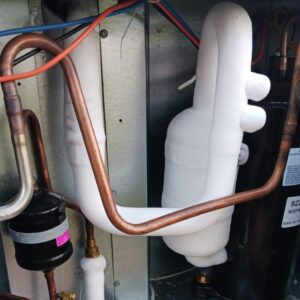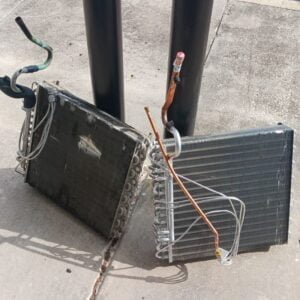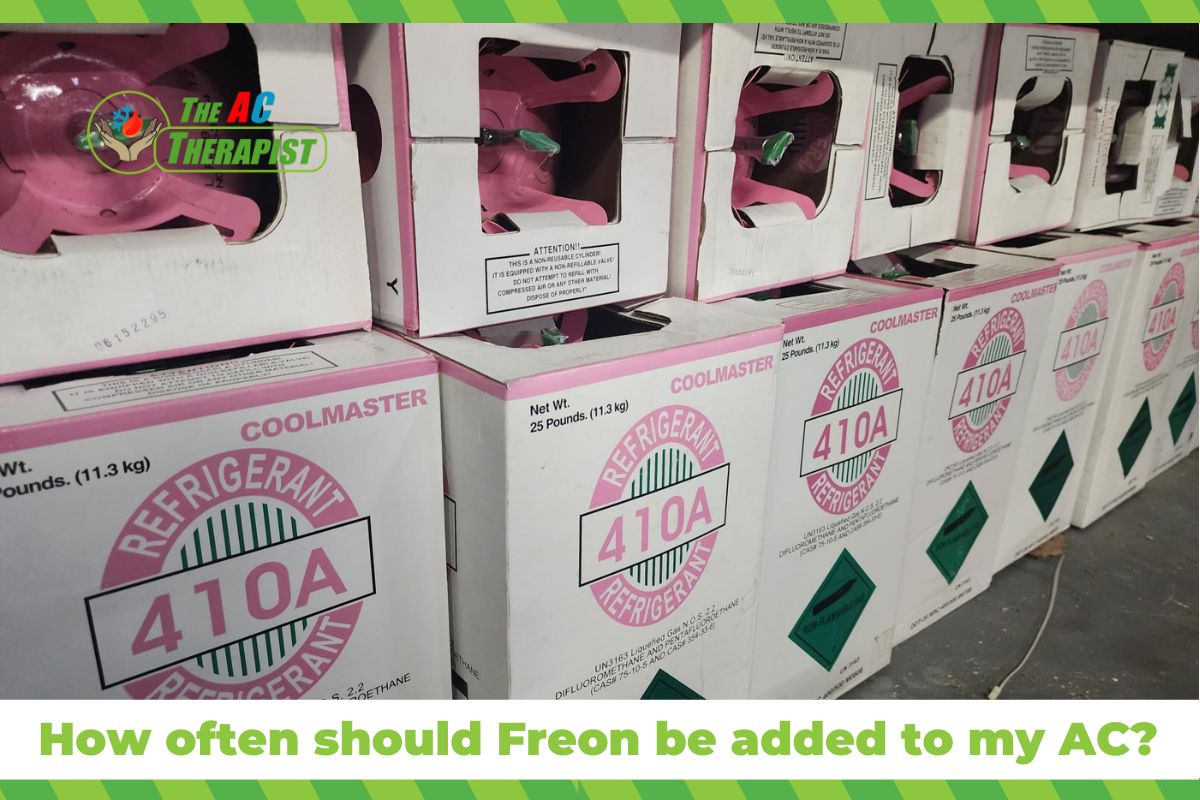How often should Freon be added to my AC?
Air conditioning is a luxury most of us can’t imagine living without, especially during hot summer months.
One critical component that keeps your AC system running smoothly is the refrigerant, commonly known as Freon (although Freon is actually a brand name for a specific type of refrigerant).
Ensuring that your AC system has the right amount of refrigerant is crucial to its performance and efficiency.
In this blog post, we will discuss the role of refrigerants in your AC system, how often you should add Freon, and other vital information to help you maintain a cool and comfortable home.
Understanding the Role of Refrigerants in Your AC System
Refrigerants play a vital role in the operation of your air conditioning system, ensuring that your home remains cool and comfortable. They are responsible for absorbing heat from the indoor air and releasing it outdoors, effectively lowering the temperature inside your living space.
Air conditioning systems utilize a closed-loop process in which refrigerants circulate between the evaporator and condenser coils.
- In the evaporator coil, the refrigerant absorbs heat from the indoor air, causing it to evaporate and change from a liquid to a gas.
- The now-cooled air is then circulated back into your home by the system’s air handler.
- The refrigerant, in its gaseous state, travels to the condenser coil, where it releases the absorbed heat into the outdoor air and reverts back to a liquid state.
- This process repeats, continuously cooling the air inside your home.
There are several types of refrigerants used in residential and commercial air conditioning systems, including hydrochlorofluorocarbons (HCFCs) like R-22, and hydrofluorocarbons (HFCs) such as R-410A. It is essential to use the appropriate refrigerant for your specific AC system, as each type has unique properties that impact the system’s performance and efficiency.
A Closer Look at Freon
Freon is a brand name for a specific type of refrigerant, chemically known as chlorodifluoromethane or R-22. It is a hydrochlorofluorocarbon (HCFC) that has been widely used in air conditioning systems, both residential and commercial, for many years. Freon was popular due to its excellent cooling properties and compatibility with a wide range of air conditioning equipment.
However, it was discovered that Freon, as an HCFC, contributes to the depletion of the ozone layer when released into the atmosphere. This environmental concern led to the phasing out of Freon under the Montreal Protocol, an international treaty aimed at protecting the ozone layer by phasing out the production and consumption of ozone-depleting substances.
As of January 1, 2020, the production and importation of R-22 (Freon) have been banned in the United States. Although existing stocks of R-22 can still be used for servicing existing air conditioning systems, it is becoming increasingly scarce and expensive.
In response to the phase-out of R-22, the air conditioning industry has shifted towards using more environmentally friendly refrigerants, such as R-410A. R-410A is a hydrofluorocarbon (HFC) that does not contribute to ozone depletion and offers improved energy efficiency. It is now the standard refrigerant used in most new residential and commercial air conditioning systems.
If your AC system still uses R-22 refrigerant, it is worth considering an upgrade to a more environmentally friendly and energy-efficient system that uses an alternative refrigerant like R-410A. This not only helps protect the environment but can also save you money on energy bills and future maintenance costs.

How Often Should Freon Be Added to Your AC System?
In an ideal world, you should never have to add Freon or any other refrigerant to your AC system. A properly installed and maintained air conditioner is designed to be a closed-loop system, meaning that the refrigerant circulates within the system without leaking or being consumed.
However, leaks can sometimes occur due to various reasons, such as:
- Age and wear of the AC system components
- Corrosion of the refrigerant lines
- Damage during installation or maintenance
- Loose connections or fittings
If your AC system has a leak, you may experience a decline in performance, insufficient cooling, or higher energy bills. In these cases, it’s crucial to have the leak repaired and the refrigerant level topped off by a professional HVAC technician.
It’s important to note that an air conditioning system should never be “topped off” with refrigerant without first identifying and repairing the source of the leak. Adding refrigerant without addressing the underlying issue may result in further damage to the system and potentially harm the environment by releasing ozone-depleting substances into the atmosphere.
To sum up, in a well-maintained, leak-free AC system, you should not need to add Freon or any other refrigerant. However, if you suspect a leak or experience any decline in performance, it’s essential to call a professional HVAC technician to diagnose and repair the problem. Regular maintenance and inspections can help prevent leaks and keep your AC system running efficiently.
Signs That Your AC System Needs More Refrigerant
If your AC system is low on refrigerant, it may exhibit several signs indicating the need for a top-up. However, it’s essential to remember that adding more refrigerant without addressing the underlying cause (such as a leak) can lead to further issues. It’s best to consult a professional HVAC technician if you notice any of the following signs:
- Warm Air: If your AC system is blowing warm air despite being set to cool, it could be due to low refrigerant levels. When there isn’t enough refrigerant to absorb heat from the indoor air, the system cannot effectively cool your home.
- Longer Cooling Cycles: If your air conditioner is taking longer than usual to cool your home or is constantly running, it may be struggling due to insufficient refrigerant. This can also lead to increased energy consumption and higher energy bills.
- Ice Formation: Ice buildup on the evaporator coils or refrigerant lines can occur when there is not enough refrigerant to absorb the heat effectively. This can cause the coils to become too cold and freeze the condensation, leading to ice formation. If left unaddressed, this can lead to further damage to the system.
- Hissing or Bubbling Noises: Unusual noises, such as hissing or bubbling, can be a sign of a refrigerant leak. The hissing sound may indicate that refrigerant is escaping from a small leak, while bubbling noises could be due to refrigerant boiling off as it leaks from the system.
- High Energy Bills: If your energy bills are suddenly higher without any significant changes in usage, it could be due to low refrigerant levels. When the system has to work harder to cool your home, it consumes more energy, leading to higher utility costs.
If you suspect that your AC system is low on refrigerant, contact a professional HVAC technician to diagnose and repair the issue. They will be able to find the cause of the problem, fix any leaks, and recharge the system with the correct amount of refrigerant, ensuring optimal performance and efficiency.

Can I fix Freon leak myself?
It is not advisable to try fixing a Freon leak or any other refrigerant leak yourself. Handling refrigerants can be hazardous and requires specialized knowledge, skills, and equipment. Moreover, attempting to fix a leak without proper training can lead to further damage, void your warranty, or even cause injury.
Instead, if you suspect a refrigerant leak in your AC system, it’s best to contact a certified HVAC technician who has the expertise and equipment to safely and effectively diagnose and repair the issue. Professionals are trained to detect leaks, handle refrigerants according to safety regulations, and fix the underlying problem before recharging the system with the correct amount of refrigerant.
In addition to safety concerns, regulations surrounding refrigerant handling and disposal have become more stringent due to environmental considerations. HVAC technicians are required to be certified by the Environmental Protection Agency (EPA) to handle and work with refrigerants, ensuring that they follow the best practices to minimize the release of harmful substances into the atmosphere.

Do leak sealers work?
Leak sealers, also known as AC stop leak products, are chemicals designed to seal small leaks in your air conditioning system. While these products can provide a temporary solution for minor leaks, they should not be considered a long-term or reliable fix for refrigerant leaks.
There are several reasons why relying on leak sealers is not the best approach:
- Effectiveness: Leak sealers may work on very small leaks, but they are often ineffective in sealing larger or more complex leaks. They also might not work on leaks that occur in certain parts of the system, such as the compressor or the evaporator coil.
- Compatibility: Some AC stop leak products may not be compatible with your specific air conditioning system or refrigerant type. Using an incompatible product can lead to further damage, reduced performance, or even a complete system failure.
- Potential for damage: Leak sealers can potentially cause damage or clogging in the AC system, particularly if overused or applied incorrectly. This can lead to more significant issues and costly repairs down the line.
- Temporary solution: Even if a leak sealer manages to temporarily seal a small leak, it does not address the underlying cause of the problem. The leak may reappear, and the system could continue to lose refrigerant, leading to decreased performance and efficiency.
We always provide the option to our customers because it is the cheapest alternative, but we always let them know it is a gamble that might or might not work.
The best course of action when dealing with refrigerant leaks is to have the issue diagnosed and repaired by a certified HVAC technician. Professionals can find the source of the leak, fix it properly, and recharge the system with the correct amount of refrigerant, ensuring optimal performance and longevity. Regular maintenance and inspections can help prevent leaks and keep your AC system running efficiently.
How much does it cost to seal an AC leak?
The cost to seal an AC leak can vary significantly depending on factors such as the severity and location of the leak, the type of air conditioning system, and the labor rates in your area. Generally, you can expect the cost to range from $200 to $1,500 or more for diagnosing and repairing a refrigerant leak.
Here’s a rough breakdown of potential costs:
- Leak Detection: HVAC technicians may charge between $100 and $300 for a leak detection service, which involves using specialized equipment and techniques to locate the source of the refrigerant leak.
- Repair Costs: The cost of repairing the leak itself depends on the location and complexity of the issue. Minor repairs, such as tightening connections or fixing small leaks in accessible parts of the system, can cost between $200 and $400. More complex repairs, such as fixing leaks in the evaporator coil or compressor, can range from $500 to $1,500 or more.
- Refrigerant Recharge: After the leak is repaired, the technician will need to recharge the system with the appropriate refrigerant. The cost for this can range from $100 to $400, depending on the type and amount of refrigerant required.
These costs are approximate and can vary based on factors like regional labor rates and the specific details of your AC system. To get an accurate estimate for sealing an AC leak in your system, it’s best to contact a local HVAC professional who can assess your situation and provide a tailored quote. Keep in mind that regular maintenance and inspections can help prevent leaks and save you money in the long run.

Upgrading Your AC System
If your air conditioning system is more than 10-15 years old, uses R-22 refrigerant (Freon), or is experiencing frequent issues, it may be time to consider upgrading to a newer, more energy-efficient model. Modern air conditioning systems offer numerous benefits, including improved performance, reduced environmental impact, and cost savings on energy bills.
When upgrading your AC system, consider the following factors:
- Environmentally Friendly Refrigerant: Choose a system that uses an environmentally friendly refrigerant, such as R-410A. This hydrofluorocarbon (HFC) refrigerant does not contribute to ozone depletion and is now the standard in most new residential and commercial air conditioning systems.
- Energy Efficiency: Look for an air conditioning system with a high Seasonal Energy Efficiency Ratio (SEER) rating. The higher the SEER rating, the more energy-efficient the system is, translating to lower energy bills and reduced environmental impact.
- Proper Sizing: Ensure your new AC system is correctly sized for your home or building. An oversized or undersized system can lead to inefficiency, reduced comfort, and increased wear and tear on the components. A professional HVAC technician can help determine the appropriate size for your needs.
- Variable-Speed Technology: Consider a system with variable-speed compressor and fan technology, which allows the AC to operate at different speeds depending on cooling demand. This results in improved efficiency, better temperature control, and reduced wear on the system components.
- Smart Thermostats: Pair your new AC system with a smart thermostat, which can optimize energy usage by learning your preferences, adjusting to your schedule, and providing energy-saving tips.
- Warranty and Support: Choose a reputable brand and installer that offer a comprehensive warranty and reliable customer support. This will ensure that you have access to assistance if any issues arise with your new system.
Upgrading your AC system to a more modern and energy-efficient model can save you money on energy bills, reduce your environmental footprint, and provide improved comfort and performance. Always consult with a professional HVAC technician to help you select the best system for your needs and ensure proper installation and maintenance.
Secure Your Comfort with The AC Therapist: The Ultimate Solution for Freon Leak Repairs
In conclusion, properly maintaining your air conditioning system is crucial to ensure its longevity, efficiency, and overall performance. While minor refrigerant leaks may seem like a trivial issue, they can lead to bigger problems, increased energy consumption, and higher utility bills. It’s essential to address refrigerant leaks promptly and professionally, rather than relying on temporary solutions or attempting DIY repairs, which may cause further damage or harm.
To ensure your AC system remains in top shape, consider enlisting the services of The AC Therapist, a reputable HVAC service provider with a team of certified technicians. With their expertise, state-of-the-art equipment, and commitment to customer satisfaction, The AC Therapist can help diagnose and repair any refrigerant leaks, recharge your system, and perform regular maintenance to keep it running smoothly.
By choosing The AC Therapist, you can rest assured that your air conditioning system will be serviced by knowledgeable professionals who prioritize environmental responsibility and adhere to the highest industry standards. Regular maintenance visits from The AC Therapist will not only address any potential issues before they become significant problems but also ensure that your system operates at peak efficiency, providing you with a comfortable living environment and lower energy bills.
Don’t wait for your AC system to show signs of trouble—be proactive and schedule a maintenance appointment with The AC Therapist today. Their expert team is ready to help you enjoy a cool, comfortable, and energy-efficient home all year round.








